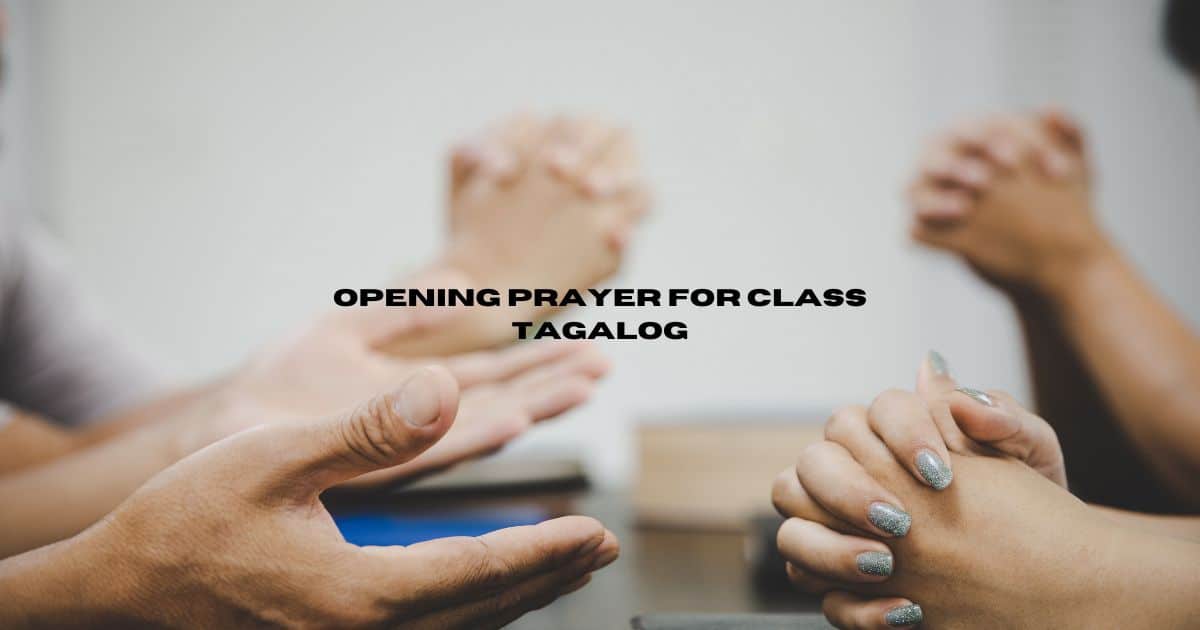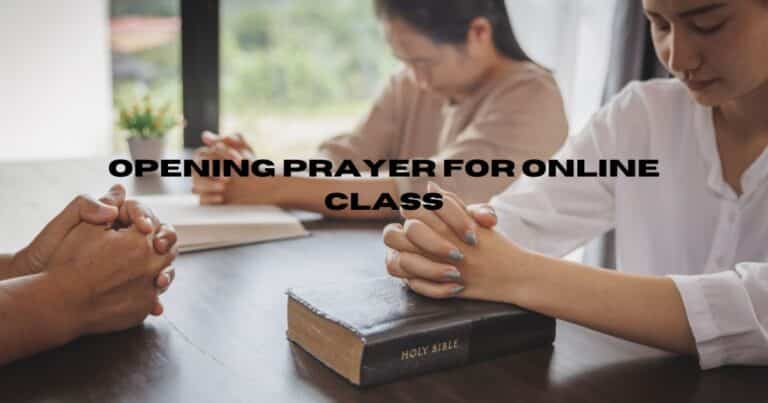Prayer serves as a cornerstone of Filipino culture and spirituality, touching every facet of daily existence, including the educational sphere. This article explores the cherished tradition of opening prayer for class Tagalog, particularly within Tagalog-speaking communities.
Recognizing the Significance of Prayer in Filipino Culture
The Filipino people share an intrinsic bond with spiritual practices and religious devotion, with Christianity, especially Catholicism, being the primary religious affiliation. Prayer functions as a channel for divine guidance, expressing thankfulness, and building communal bonds.
Short Opening Prayer Tagalog For Class
“Almighty Lord, illuminate our minds with wisdom and comprehension as we begin our educational journey today. Amen.”
The Significance of Prayer Before Class
The significance of prayer before class lies in its ability to foster focus, mindfulness, and a sense of unity among students.
Connecting with Faith and Spirituality
Filipino students traditionally initiate their academic day by establishing a spiritual connection through prayer. This sacred practice lays a spiritual groundwork, cultivating virtues of humility, empathy, and determination.
Creating a Positive Learning Environment
Starting class with prayer establishes an atmosphere of reverence and mutual respect, extending beyond divine worship to encompass fellow students and teachers. It cultivates an environment that nurtures both academic excellence and personal development.
Common Prayers Used Before Class in Tagalog
Within Tagalog-speaking areas, several traditional prayers are regularly offered before classes begin. These include:
- “Ama Namin” (Our Father): The fundamental Christian prayer, seeking divine guidance and protection.
- “Ang Pagsisisi” (Act of Contrition): A prayer seeking forgiveness and redemption, highlighting the value of self-reflection.
- “Panalangin sa Umaga” (Morning Prayer): A prayer of gratitude, seeking blessings and strength for the day ahead.
How Prayer Before Class Fosters Discipline and Respect
The practice of prayer cultivates discipline and respect among learners, motivating them to approach each day with purpose and reverence. It encourages important habits such as punctuality and focus, which are vital for academic success.
Incorporating Prayer into Educational Settings
Incorporating prayer into educational settings creates a mindful and respectful atmosphere that enhances students’ emotional and academic well-being.
Private Schools and Religious Institutions
Prayer before class is fundamentally woven into the educational fabric of private schools and religious institutions, reflecting their core values. Students actively participate in religious observances as part of their comprehensive education.
Public Schools and Secular Environments
Integrating prayer in public schools and secular settings requires thoughtful attention to legal and cultural considerations. While moments of silent reflection or inclusive prayers may be practiced, institutions aim to honor diverse religious viewpoints.
Practical Tips for Implementing Prayer Before Class
Practical tips for implementing prayer before class include setting aside a few moments of quiet reflection, offering inclusive options for all beliefs, and ensuring the practice is voluntary and respectful of diverse perspectives.
Respecting Diversity and Inclusion
Teachers must consider the varied religious beliefs present in their classrooms. Offering alternatives like quiet reflection or inclusive spiritual practices ensures all students feel welcomed and respected.
Providing Options for Non-Religious Students
For students who hold different beliefs or none at all, schools provide thoughtful alternatives such as mindful reflection or contemplative activities, ensuring every student feels valued and included within the educational community.
The Role of Teachers and Educators in Supporting Prayer Practices
Educators serve as essential facilitators and mentors in the practice of prayer before class, creating an atmosphere where students can authentically express their spirituality. Their guidance helps establish a supportive environment that nurtures both personal faith and mutual understanding.
Challenges and Controversies Surrounding Prayer in Schools
Challenges and controversies surrounding prayer in schools include balancing religious freedoms with legal restrictions, ensuring inclusivity for diverse beliefs, and navigating the separation of church and state in public education.
Legal Considerations
The principle of separating religious institutions from state entities presents complex legal challenges regarding religious practices in public educational settings. Educational institutions must carefully balance these legal requirements while protecting individual religious freedoms.
Parental Concerns
Many parents express apprehension about incorporating prayer in educational settings, worried about potential religious influence or their children feeling excluded. Maintaining transparent communication channels between educational institutions and families is crucial for addressing these valid concerns.
Navigating Cultural Sensitivities and Religious Freedom
Creating harmony between cultural awareness and religious liberty demands thoughtful consideration and ongoing dialogue within school communities. Maintaining respect for diverse beliefs while promoting inclusivity remains fundamental to creating a positive learning atmosphere.
The Benefits of Prayer Before Class Beyond Spiritual Health
The benefits of prayer before class extend beyond spiritual health, promoting mental clarity, focus, emotional stability, and fostering a positive, respectful learning environment.
Fostering a Sense of Community
The practice of prayer before class cultivates unity and connection among students and teachers, bridging cultural and religious differences. It encourages empathy, teamwork, and mutual respect, vital elements for creating an enriching educational experience.
Enhancing Focus and Concentration
Research indicates that dedicated moments of quiet reflection, including prayer, can significantly improve mental focus and concentration, potentially leading to better academic outcomes. These peaceful moments help center students’ minds and reduce anxiety before learning.
Personal Testimonials and Experiences
Countless individuals share compelling stories about how prayer before class has positively influenced their educational journey and personal growth. These authentic experiences highlight prayer’s transformative impact in educational settings, encouraging others to embrace this meaningful tradition.
Research and Studies on the Impact of Prayer in Education
Extensive academic research has investigated prayer and spirituality’s influence on educational outcomes, student wellness, and classroom dynamics. These scientific investigations provide compelling evidence supporting the potential advantages of incorporating prayer in educational environments.
Conclusion: Embracing Prayer Tagalog Before Class
Prayer before class represents more than just a religious observance; it embodies unity, respect, and mindfulness within Filipino educational culture. Through embracing this meaningful tradition, educators foster inclusive learning spaces where students feel supported, valued, and empowered to excel both academically and spiritually.
Is this article helpful? Keep reading our blog for more.
Frequently Asked Questions
Is prayer before class mandatory in Filipino schools?
While prayer before class remains a widespread tradition in numerous Filipino educational institutions, its mandatory status varies among schools. The implementation of prayer activities typically depends on each institution’s religious orientation and established guidelines.
How can non-religious students engage in prayer before class?
Students who don’t follow specific religious practices can engage in quiet contemplation or participate in alternative reflective exercises that resonate with their personal worldview. Educational institutions should ensure they provide inclusive options that honor every student’s beliefs.
Are there legal limitations on prayer in public schools?
Within secular educational frameworks, specific legal parameters govern religious practices in public schools to maintain the separation between religious and state institutions. Schools must carefully navigate these regulations while safeguarding individual religious freedoms.
What role do parents play in supporting or opposing prayer in schools?
Parents serve as crucial advocates in representing their children’s religious rights and beliefs within the school system. Educational institutions should maintain open communication channels with parents and thoughtfully address their perspectives regarding religious practices.
How can educators ensure that prayer before class is inclusive and respectful of diverse beliefs?
Educational professionals can foster inclusivity by implementing alternative activities for non-religious students, embracing cultural and religious diversity, and encouraging meaningful dialogue within the school community. Through these efforts, educators can transform prayer before class into an enriching experience that resonates with all students.





